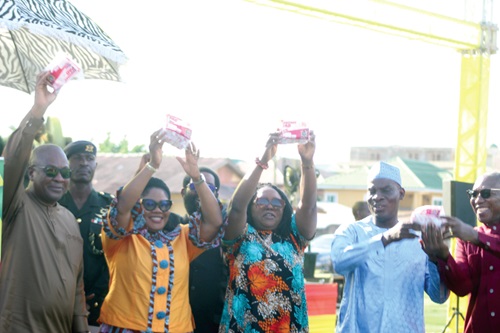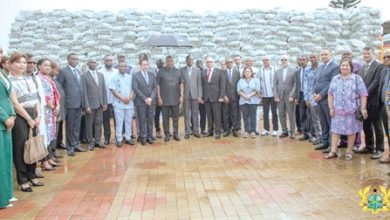National Sanitary Pad Distribution Programme is a bold step towards restoring dignity – President Mahama
Free sanitary pads for 2 million schoolgirls: Move to restore dignity - President Mahama

President John Dramani Mahama has described the National Sanitary Pad Distribution Programme as a bold step towards restoring dignity, confidence, and equal opportunity for schoolgirls in the country.
“This initiative is more than just the distribution of sanitary pads.
It is a clear declaration that no girl in Ghana should miss school because of her menstrual period,” he said at the launch of the programme in Accra yesterday.
“I’m happy we have reached this point, where everyone accepts that it is appropriate to invest national resources to ensure that our girls can go to school without fear of becoming the target of mockery.
“Mothers, you no longer need to give your children cloth or tissue. We will provide them with the proper sanitary products they need to attend school confidently,” he added.
The launch, held on the theme: “Improving Menstrual Health and Hygiene for Girls for Quality Education”, brought together the Ga Mantse, Nii Tackie Teiko Tsuru II; the Deputy Minister of Education, Dr Clement Abas Apaak; the Deputy Minister of Gender, Children and Social Protection, Rita Naa Odoley Sowah; the Deputy Minority Leader, Patricia Appiagyei; the Member of Parliament for Ablekuma South, Alfred Okoe Vanderpuye, and other ministers, directors and staff of the various ministries.
There were also students from Labone SHS, Ada Technical and Gorm D/A Basic School, Bishop Girls Basic School, MoH Basic Schools and others.
Campaign promise
The programme is aimed at providing sanitary pads for over two million schoolgirls in public basic and secondary schools across the country for free.
It is in fulfilment of a commitment made in the 2024 Manifesto of the National Democratic Congress (NDC) to ensure that all schoolgirls have access to menstrual hygiene products.
Girl-child challenge
“Far too many of our daughters, nieces and sisters have been left behind — not because they lack intelligence, ambition or potential — but simply because they lack access to basic sanitary products,” he said.
Citing research as his basis, President Mahama said some girls miss up to five school days each month, amounting to nearly 40 days per academic year, due to a lack of access to menstrual hygiene products.
“That is not just a statistic. It’s a real girl, falling behind, losing confidence and struggling to catch up, all because of a natural, biological process,” he added.
“This situation is unacceptable in a Ghana that seeks progress, equity and justice”.
President Mahama reiterated his administration’s commitment to eliminating period poverty and breaking down the silent barriers holding girls back from achieving their full potential.
He said menstruation should never be a source of shame or a barrier to education and achievement, hence the programme aimed to eliminate one of the silent but powerful barriers to the dreams of the girl-child.
The programme, he said, was a multi-ministerial collaboration involving the Ministry of Education, the Ministry of Gender, Children and Social Protection, and the Ministry of Finance and Economic Planning.
He said it aligned with the country’s national development priorities and its commitments to the Sustainable Development Goals — particularly SDG 4 (Quality Education) and SDG 5 (Gender Equality).
Partnership
President Mahama called on the private sector and traditional leaders to partner with the government to build local capacity for sanitary pad production.
“Let us create jobs while keeping our girls in school. Let this grow from a social intervention to a national enterprise,” he said.
“But more than that, it reflects our Ghanaian values — fairness, dignity and equal opportunity for all children, boys and girls alike,” he said.
To every girl-child in the country, President Mahama said: “You are not alone. You are not forgotten.
You are not invisible. We see you, we believe in your potential, and we will stand with you every month, every year.”
He commended the teachers and headmistresses, who have long witnessed the struggles of girls, assuring them that the change they had long hoped for has arrived.
“Now, you will see a transformation. Our girls will come to school with confidence and dignity, ready to learn and grow,” he said.
President Mahama thanked the development partners and civil society actors for their commitment to raising their voices and standing with the girls.
President Mahama urged the country to walk forward “not with shame but with pride,” and see the initiative as the beginning of a movement that protects the future of girls and ensures their rightful place in Ghana’s classrooms, science labs, sports fields and leadership.
Background
An amount of GH¢292.4 million was allocated in the 2024/2025 budget for the supply of sanitary pads to female students in public basic and secondary schools across the country.
In a press briefing in Accra, jointly organised by the Ministry of Education, and the Ministry of Gender, Children and Social Protection (MoGCSP), the ministries said they had completed procurement processes, and that all measures had been put in place to ensure the effective distribution of sanitary pads to all public schools in the country.
Regional and district directors of education were tasked to monitor and report on the distribution to the schools.
Different companies have been given the opportunity to participate in the programme, adding that the programme was expected to contribute to national development and improve economic growth.
Regional Ministers and District Chief Executives will also hold similar events in their respective regions to pave the way for the distribution.
Commitment
The Minister of Education, Haruna Iddrisu, affirmed the President’s commitment to girls’ menstrual health and dignity.
The Minister for Gender, Children and Social Protection, Dr Agnes Naa Momo Lartey, said the initiative formed part of the government’s 120-day social contract pledged by former President John Dramani Mahama.
She described the sanitary pad initiative as a major milestone in the effort to eradicate stigma, absenteeism and educational setbacks caused by menstruation.
“Over five million girls in Ghana are of menstruating age, and many lack access to proper hygiene products,” she said.
“This programme will improve menstrual hygiene management, reduce stigma and support academic performance.”
She stressed that period poverty remained a serious barrier, especially in marginalised communities, and urged all stakeholders — parents, teachers, community leaders and development partners — to break the silence around menstruation.
“This is not just about distributing pads. It’s about affirming dignity, gender equality and our collective responsibility to remove barriers to girls’ education,” Dr Lartey added.



